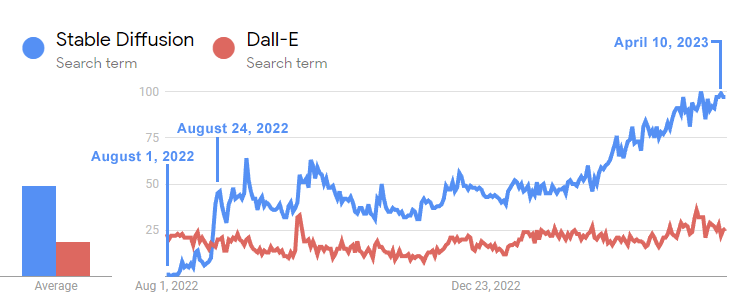
Leaked Google Memo Admits Defeat By Open Source AI
- News
- May 6, 2023
- No Comment
- 148
[ad_1]
A leaked Google memo affords some extent by level abstract of why Google is shedding to open supply AI and suggests a path again to dominance and proudly owning the platform.
The memo opens by acknowledging their competitor was by no means OpenAI and was all the time going to be Open Supply.
Can not Compete Towards Open Supply
Additional, they admit that they don’t seem to be positioned in any solution to compete towards open supply, acknowledging that they’ve already misplaced the battle for AI dominance.
They wrote:
“We’ve performed quite a lot of trying over our shoulders at OpenAI. Who will cross the following milestone? What is going to the following transfer be?
However the uncomfortable reality is, we aren’t positioned to win this arms race and neither is OpenAI. Whereas we’ve been squabbling, a 3rd faction has been quietly consuming our lunch.
I’m speaking, in fact, about open supply.
Plainly put, they’re lapping us. Issues we contemplate “main open issues” are solved and in folks’s arms in the present day.”
The majority of the memo is spent describing how Google is outplayed by open supply.
And regardless that Google has a slight benefit over open supply, the writer of the memo acknowledges that it’s slipping away and can by no means return.
The self-analysis of the metaphoric playing cards they’ve dealt themselves is significantly downbeat:
“Whereas our fashions nonetheless maintain a slight edge by way of high quality, the hole is closing astonishingly rapidly.
Open-source fashions are quicker, extra customizable, extra non-public, and pound-for-pound extra succesful.
They’re doing issues with $100 and 13B params that we battle with at $10M and 540B.
And they’re doing so in weeks, not months.”
Giant Language Mannequin Measurement is Not an Benefit
Maybe probably the most chilling realization expressed within the memo is Google’s measurement is now not a bonus.
The outlandishly massive measurement of their fashions at the moment are seen as disadvantages and never in any manner the insurmountable benefit they thought them to be.
The leaked memo lists a sequence of occasions that sign Google’s (and OpenAI’s) management of AI could quickly be over.
It recounts that hardly a month in the past, in March 2023, the open supply neighborhood obtained a leaked open supply mannequin massive language mannequin developed by Meta referred to as LLaMA.
Inside days and weeks the worldwide open supply neighborhood developed all of the constructing elements essential to create Bard and ChatGPT clones.
Refined steps reminiscent of instruction tuning and reinforcement studying from human suggestions (RLHF) had been rapidly replicated by the worldwide open supply neighborhood, on a budget no much less.
- Instruction tuning
A strategy of fine-tuning a language mannequin to make it do one thing particular that it wasn’t initially skilled to do. - Reinforcement studying from human suggestions (RLHF)
A method the place people price a language fashions output in order that it learns which outputs are passable to people.
RLHF is the method utilized by OpenAI to create InstructGPT, which is a mannequin underlying ChatGPT and permits the GPT-3.5 and GPT-4 fashions to take directions and full duties.
RLHF is the hearth that open supply has taken from
Scale of Open Supply Scares Google
What scares Google particularly is the truth that the Open Supply motion is ready to scale their initiatives in a manner that closed supply can’t.
The query and reply dataset used to create the open supply ChatGPT clone, Dolly 2.0, was completely created by 1000’s of worker volunteers.
Google and OpenAI relied partially on query and solutions from scraped from websites like Reddit.
The open supply Q&A dataset created by Databricks is claimed to be of a better high quality as a result of the people who contributed to creating it had been professionals and the solutions they supplied had been longer and extra substantial than what’s present in a typical query and reply dataset scraped from a public discussion board.
The leaked memo noticed:
“At first of March the open supply neighborhood received their arms on their first actually succesful basis mannequin, as Meta’s LLaMA was leaked to the general public.
It had no instruction or dialog tuning, and no RLHF.
Nonetheless, the neighborhood instantly understood the importance of what they’d been given.
An amazing outpouring of innovation adopted, with simply days between main developments…
Right here we’re, barely a month later, and there are variants with instruction tuning, quantization, high quality enhancements, human evals, multimodality, RLHF, and so forth. and so forth. a lot of which construct on one another.
Most significantly, they’ve solved the scaling downside to the extent that anybody can tinker.
Lots of the new concepts are from atypical folks.
The barrier to entry for coaching and experimentation has dropped from the entire output of a significant analysis group to at least one individual, a night, and a beefy laptop computer.”
In different phrases, what took months and years for Google and OpenAI to coach and construct solely took a matter of days for the open supply neighborhood.
That must be a really horrifying state of affairs to Google.
It’s one of many the explanation why I’ve been writing a lot concerning the open supply AI motion because it really appears like the place the way forward for generative AI will probably be in a comparatively brief time period.
Open Supply Has Traditionally Surpassed Closed Supply
The memo cites the current expertise with OpenAI’s DALL-E, the deep studying mannequin used to create photographs versus the open supply Secure Diffusion as a harbinger of what’s at present befalling Generative AI like Bard and ChatGPT.
Dall-e was launched by OpenAI in January 2021. Secure Diffusion, the open supply model, was launched a 12 months and a half later in August 2022 and in a number of brief weeks overtook the recognition of Dall-E.
This timeline graph exhibits how briskly Secure Diffusion overtook Dall-E:

The above Google Developments timeline exhibits how curiosity within the open supply Secure Diffusion mannequin vastly surpassed that of Dall-E inside a matter of three weeks of its launch.
And although Dall-E had been out for a 12 months and a half, curiosity in Secure Diffusion stored hovering exponentially whereas OpenAI’s Dall-E remained stagnant.
The existential risk of comparable occasions overtaking Bard (and OpenAI) is giving Google nightmares.
The Creation Means of Open Supply Mannequin is Superior
One other issue that’s alarming engineers at Google is that the method for creating and bettering open supply fashions is quick, cheap and lends itself completely to a world collaborative strategy frequent to open supply initiatives.
The memo observes that new methods reminiscent of LoRA (Low-Rank Adaptation of Giant Language Fashions), enable for the fine-tuning of language fashions in a matter of days with exceedingly low price, with the ultimate LLM corresponding to the exceedingly costlier LLMs created by Google and OpenAI.
One other profit is that open supply engineers can construct on high of earlier work, iterate, as a substitute of getting to start out from scratch.
Constructing massive language fashions with billions of parameters in the best way that OpenAI and Google have been doing will not be crucial in the present day.
Which often is the level that Sam Alton lately was hinting at when he lately mentioned that the period of large massive language fashions is over.
The writer of the Google memo contrasted a budget and quick LoRA strategy to creating LLMs towards the present huge AI strategy.
The memo writer displays on Google’s shortcoming:
“In contrast, coaching big fashions from scratch not solely throws away the pretraining, but in addition any iterative enhancements which have been made on high. Within the open supply world, it doesn’t take lengthy earlier than these enhancements dominate, making a full retrain extraordinarily pricey.
We ought to be considerate about whether or not every new utility or concept actually wants an entire new mannequin.
…Certainly, by way of engineer-hours, the tempo of enchancment from these fashions vastly outstrips what we are able to do with our largest variants, and the perfect are already largely indistinguishable from ChatGPT.”
The writer concludes with the conclusion that what they thought was their benefit, their big fashions and concomitant prohibitive price, was really a drawback.
The worldwide-collaborative nature of Open Supply is extra environment friendly and orders of magnitude quicker at innovation.
How can a closed-source system compete towards the overwhelming multitude of engineers world wide?
The writer concludes that they can’t compete and that direct competitors is, of their phrases, a “shedding proposition.”
That’s the disaster, the storm, that’s growing outdoors of Google.
If You Can’t Beat Open Supply Be a part of Them
The one comfort the memo writer finds in open supply is that as a result of the open supply improvements are free, Google may also reap the benefits of it.
Lastly, the writer concludes that the one strategy open to Google is to personal the platform in the identical manner they dominate the open supply Chrome and Android platforms.
They level to how Meta is benefiting from releasing their LLaMA massive language mannequin for analysis and the way they now have 1000’s of individuals doing their work at no cost.
Maybe the large takeaway from the memo then is that Google could within the close to future attempt to replicate their open supply dominance by releasing their initiatives on an open supply foundation and thereby personal the platform.
The memo concludes that going open supply is probably the most viable choice:
“Google ought to set up itself a pacesetter within the open supply neighborhood, taking the lead by cooperating with, moderately than ignoring, the broader dialog.
This most likely means taking some uncomfortable steps, like publishing the mannequin weights for small ULM variants. This essentially means relinquishing some management over our fashions.
However this compromise is inevitable.
We can’t hope to each drive innovation and management it.”
Open Supply Walks Away With the AI Hearth
Final week I made an allusion to the Greek fantasy of the human hero Prometheus stealing fireplace from the gods on Mount Olympus, pitting the open supply to Prometheus towards the “Olympian gods” of Google and OpenAI:
I tweeted:
“Whereas Google, Microsoft and Open AI squabble amongst one another and have their backs turned, is Open Supply strolling off with their fireplace?”
The leak of Google’s memo confirms that remark nevertheless it additionally factors at a attainable technique change at Google to be part of the open supply motion and thereby co-opt it and dominate it in the identical manner they did with Chrome and Android.
Learn the leaked Google memo right here:
[ad_2]
Source link









